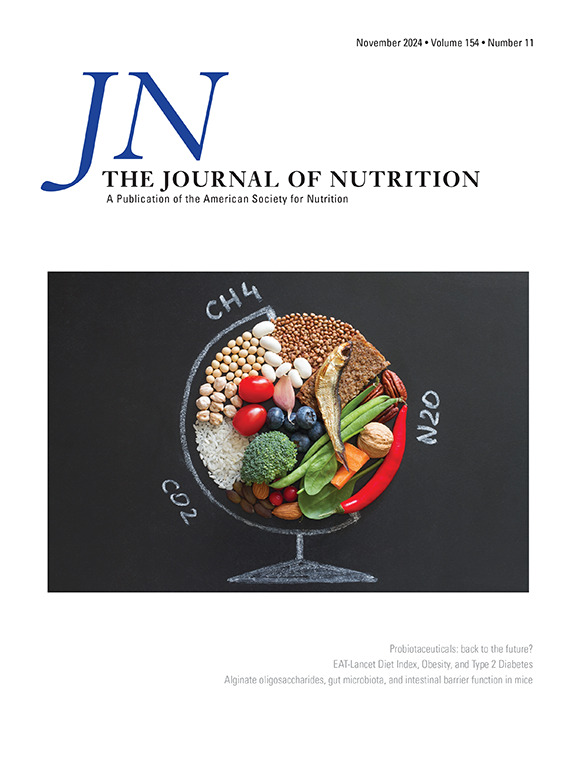绝经后妇女膳食补充剂的使用与选择的血清营养生物标志物相关:一项对照喂养研究的结果
IF 3.8
3区 医学
Q2 NUTRITION & DIETETICS
引用次数: 0
摘要
背景:膳食补充剂的使用在老年人中很常见;然而,在这一人群中,补充剂使用与相应的营养生物标志物之间的关系尚不清楚。目的:本研究旨在确定使用膳食补充剂的老年妇女是否具有较高的相应生物标志物血清浓度,以及使用多种营养补充剂来源的老年妇女是否具有逐渐升高的血清营养素浓度。方法:来自妇女健康倡议(WHI)的参与者参加了一项为期2周的喂养研究(n = 153)。妇女们吃的是个性化的菜单,并保持日常膳食补充剂的摄入量。饲喂期结束时测定血清维生素B12、叶黄素+玉米黄质和磷脂脂肪酸(PLFAs)。使用膳食补充剂使用的多元线性回归和对数转化血清生物标志物浓度的参与者特征来评估相关性。单因素方差分析(ANOVA)确定参与者之间的平均血清生物标志物是否存在显著差异,该差异基于通过膳食补充剂摄入的营养素来源的数量。结果:在多元线性回归模型(n = 152)中,维生素B12补充剂使用者的维生素B12几何平均血清浓度比非使用者高58% (p < 0.001)。omega-3脂肪酸膳食补充剂使用者的几何平均血清磷脂DHA+EPA比非使用者高38-46% (p < 0.0001)。相比之下,使用叶黄素+玉米黄质补充剂与血清叶黄素+玉米黄质无关(p = 0.72)。服用两种维生素B12和叶黄素+玉米黄质膳食补充剂的人,其相应的血清生物标志物高于只服用一种复合维生素和两者都不服用的人(p < 0.0001)。结论:维生素B12和omega-3脂肪酸补充剂的使用分别与较高的血清生物标志物相关。含有叶黄素+玉米黄质的膳食补充剂可能不会增加绝经后妇女的血清生物标志物。该试验在clinicaltrials.gov注册为NCT00000611。本文章由计算机程序翻译,如有差异,请以英文原文为准。
Dietary Supplement Use Is Associated with Select Serum Nutrient Biomarkers among Postmenopausal Women: Results from a Controlled Feeding Study
Background
Dietary supplement use is common among older adults; however, the association between supplement use and corresponding nutrient biomarkers in this population is less well understood.
Objectives
This study aimed to determine whether older women using dietary supplements had higher serum concentrations of corresponding biomarkers and whether those using multiple supplement sources of the nutrient had incrementally higher serum nutrient concentrations.
Methods
Participants from the Women’s Health Initiative enrolled in a 2-wk feeding study (n = 153). Women consumed an individualized menu and maintained intake of usual dietary supplements. Serum vitamin B12, lutein + zeaxanthin, and phospholipid fatty acids were measured at the end of the feeding period. Multiple linear regression of dietary supplement use, and participant characteristics on log-transformed serum biomarker concentrations was used to evaluate the association. One-way analysis of variance determined whether there were significant differences in mean serum biomarkers among participants based on the number of sources of a nutrient consumed via dietary supplement.
Results
In multiple linear regression models (n = 152), users of vitamin B12 supplements had 58% higher geometric mean serum concentrations of vitamin B12 than nonusers (P < 0.001). Users of omega-3 fatty acid dietary supplements had geometric mean serum phospholipid docosahexaenoic acid + eicosapentaenoic acid that were 38%–46% higher than nonusers (P < 0.0001). In contrast, use of lutein + zeaxanthin-containing supplements was not associated with serum lutein + zeaxanthin (P = 0.72). Users of 2 sources of vitamin B12 and lutein + zeaxanthin-containing dietary supplements had higher corresponding serum biomarkers than users of only a multivitamin and users of neither (P < 0.0001).
Conclusions
The use of vitamin B12 and omega-3 fatty acid supplements were associated with higher serum biomarkers, respectively. Dietary supplements containing lutein + zeaxanthin may not increase serum biomarkers among postmenopausal women.
Trial registration number
This trial was registered at clinicaltrials.gov as NCT00000611.
求助全文
通过发布文献求助,成功后即可免费获取论文全文。
去求助
来源期刊

Journal of Nutrition
医学-营养学
CiteScore
7.60
自引率
4.80%
发文量
260
审稿时长
39 days
期刊介绍:
The Journal of Nutrition (JN/J Nutr) publishes peer-reviewed original research papers covering all aspects of experimental nutrition in humans and other animal species; special articles such as reviews and biographies of prominent nutrition scientists; and issues, opinions, and commentaries on controversial issues in nutrition. Supplements are frequently published to provide extended discussion of topics of special interest.
 求助内容:
求助内容: 应助结果提醒方式:
应助结果提醒方式:


